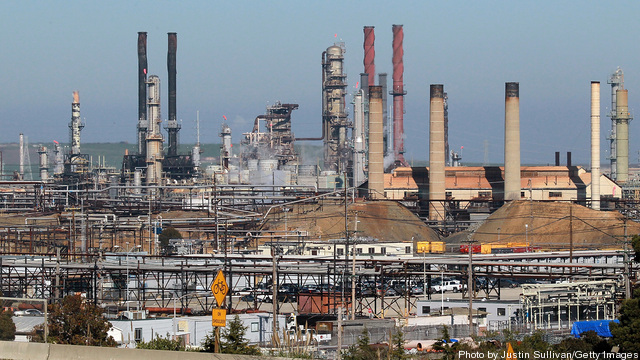
The Organization of Petroleum Exporting Countries wants its members to rein in oil output, the group’s chief was quoted as saying Wednesday. OPEC must rein in output in line with the agreed ceiling of 30 million barrels a day, OPEC Secretary-General Abdalla Salem el-Badri was quoted as saying by the Gulf Oil Review. OPEC is still producing 1.2 million barrels a day above this threshold despite an agreement to keep that level in June, according to data from secondary sources compiled by OPEC analysts last week.
International
Sign up and get Breaking Energy news in your inbox.
We will never sell or share your information without your consent. See our privacy policy.
Refining has long been a low-margin business, not for the faint of heart. The difference between what refiners pay for input and what they get for output, known as the crack spread, is traded on major oil markets. It sometimes goes negative, meaning refiners lose money on every barrel.
In the 1970s, with widespread worries over fuel supplies, US refiners overbuilt capacity. Since the 1980s, refiners have sold, merged, and shut down excess capacity, and upgraded capabilities, resulting in fewer refiners but more capacity actually utilized and better economics overall. Keep reading →

Firefighters have contained a blaze at Chevron Corp.’s (CVX) Richmond refinery in California, but the fire, which broke out Monday, is still burning.
 Indian passengers sit on the railway tracks near the platform of Sealdah train station waiting for the resumption of services during a power failure in Kolkata on July 31, 2012.
Indian passengers sit on the railway tracks near the platform of Sealdah train station waiting for the resumption of services during a power failure in Kolkata on July 31, 2012.
Even on a good day, millions of people in India are without access to electricity or deal with power outages on a fairly regular basis. However, the massive power failures that hit the country during the last days of July were striking in how widespread they were. Keep reading →

Luke Nicholson takes a late and frugal lunch of soup and bread in the fourth-floor conference room of a former fabric warehouse in London’s East End. The walls are thinly-painted brick, the floors are bare wooden planks, and there’s a visible gap by a nearby window frame, letting air and light in through a place they shouldn’t go.
It’s an unlikely setting for Nicholson’s company Carbon Culture, a cutting-edge clean-tech startup that writes software to monitor energy consumption, expenditure and carbon emissions in eight U.K. government departments, and is about to roll its product out to the private sector. Keep reading →

“No rock is an island,” atoll tale from Herbert Smith, a quote that stands out given the significance of Okinotorishima and its status under the international law of the sea.
In 1931, approximately 350 years after mariners of all stripes began passing by (or over, depending on the tide) a coral reef referred to through the ages as Parece Vela (“looks like a sail”) and Douglas Reef; the Japanese navy (seeing a hydroplane base where others had seen a sail, or less) claimed this unassuming atoll for Japan and named it “Okinotorishima.” Keep reading →

No-one could accuse AMEE of having modest goals.
Since 2007, the East London-based clean-technology company has been accumulating energy and environmental information from governments, companies and non-governmental organizations around the world with the goal of becoming the leading global source of data that can be used to calculate corporate carbon footprints or supply-chain energy consumption. Keep reading →

The traffic circle at the intersection of Old Street and City Road in East London’s Shoreditch neighborhood would be just another ugly piece of urban infrastructure if it hadn’t become identified with the city’s booming technology industry.
The circle – or roundabout, as the Brits call the familiar road features – is at the heart of a cluster of high-tech firms ranging from Google and Intel to hundreds of startups that have opened their doors in the last four years, generating a creative cluster that has invited comparisons with California’s Silicon Valley. Keep reading →
 Prime Minister Stephen Harper (L) of Canada welcomes US President Barack Obama to the G8 Summit at Deerhurst Resort in Huntsville, Ontario, on June 25, 2010.
Prime Minister Stephen Harper (L) of Canada welcomes US President Barack Obama to the G8 Summit at Deerhurst Resort in Huntsville, Ontario, on June 25, 2010.
The recently announced high-profile oil and gas acquisitions by Chinese state-controlled companies highlight the numerous opportunities for the US and Canada to both partner and compete in global energy markets. Keep reading →

Vanadium is a metal used in the steel, aerospace and energy storage industries – and as with virtually all commodities – the supply, demand and price outlook for this commodity varies depending on who one speaks with.
The energy and metals markets first collided in the 1970’s and 80’s when oil and gas companies looking to expand their businesses merged with mining companies. For example, Union Oil of California (UNOCAL) acquired rare earth miner Molycorp in 1977 – UNOCAL was subsequently acquired by Chevron in 2005, making Molycorp a fully owned subsidiary of the oil giant. Keep reading →
